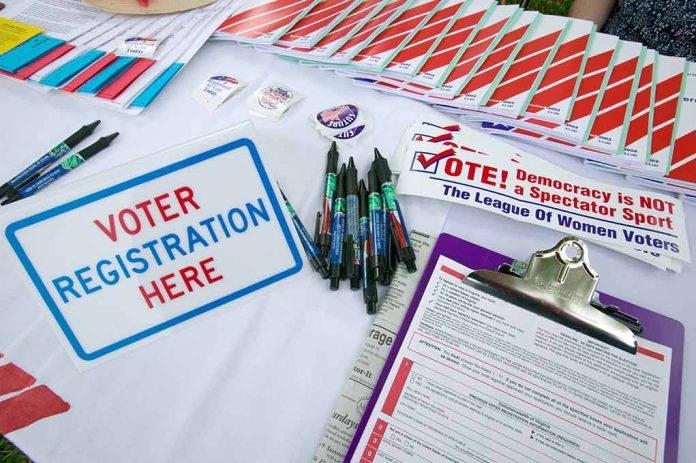
House Democrats push back against a voter ID requirement in a crucial stopgap spending bill, risking a government shutdown.
At a Glance
- House Speaker Mike Johnson withdrew a six-month stopgap spending bill due to opposition.
- The bill included a voter ID requirement, facing resistance from Democrats and some GOP members.
- Senate Majority Leader Chuck Schumer criticized the bill and suggested bipartisan cooperation.
- Former President Donald Trump urged Republicans to demand a voter ID provision.
- A Senate vote or government shutdown looms on the horizon.
House Democrats Resist Voter ID Requirement
House Democrats, under Minority Leader Hakeem Jeffries, firmly opposed a voter ID provision in the critical stopgap spending bill aimed at funding the federal government. Jeffries argued that inserting such contentious requirements into essential funding legislation obstructs the legislative process and threatens government service continuity.
This provision, which necessitated presenting ID to register for federal elections, was seen by Democrats as a strategic move to disenfranchise voters. They contended that it clashed with their efforts to maintain accessible and fair voting for all constituents.
The bill, initially introduced by House Speaker Mike Johnson, also faced opposition from within the GOP. Several Republican senators and a veto threat from the Biden administration added to the bill’s challenges. Despite Johnson’s emphasis on the government’s need for funding and preventing non-citizens from voting, the bill struggled to gain traction.
Opposition Mounts Within GOP Ranks
Johnson highlighted the importance of ensuring only U.S. citizens participate in voting, stating, “And I want any member of Congress, in either party, to explain to the American people why we should not ensure that only U.S. citizens are voting in U.S. elections.”
However, resistance was not limited to Democrats. Connecticut Rep. Rosa DeLauro called for bipartisan negotiations, while Maine Sen. Susan Collins suggested a shorter stopgap bill through mid-December. Furthermore, West Virginia Sen. Shelley Moore Capito hinted that the Senate might intervene if the House failed to act.
Election Security vs. Government Shutdown
Johnson’s insistence on the voter ID provision came despite research indicating the rarity of non-citizen voting. Yet, former President Donald Trump’s influence loomed large as he urged Republicans not to support any short-term spending measure without the voter ID clause. This position reflects the broader GOP narrative on election integrity and security.
Senate Majority Leader Chuck Schumer dismissed the bill as a “waste of time” and encouraged Johnson to focus on a bipartisan approach, stating, “Is it any surprise that the speaker’s purely partisan CR seems to be running into trouble?”, he stated.
143 House Democrats voted AGAINST prohibiting non-citizens from voting in our nation’s capital city.
198 House Democrats voted AGAINST requiring proof of U.S. citizenship for voter registration.
202 House Democrats voted AGAINST returning a question on U.S. citizenship to the…
— Rep. Andrew Clyde (@Rep_Clyde) September 10, 2024
Future Implications and Negotiations
Johnson’s limited leverage with a narrow 220-211 Republican majority creates additional hurdles in pushing through the stopgap bill. With Senate Republican leader Mitch McConnell opposing a government shutdown, the stakes remain high.
House Minority Leader Hakeem Jeffries made clear that the Democratic caucus would oppose any bill that either extends into 2025 or includes the voter ID provision. He urged for cooperation with traditional Republicans, stating, “The House should stop wasting time on a CR proposal that cannot become law.”
The ongoing partisan battle highlights the deep divide over voter identification laws and election integrity. As the U.S. government edges closer to a potential shutdown, both parties must reconcile their differences to ensure the continuity of essential services.
Sources
- Government Could Shut Down Before Election as Democrats Balk at Citizen Voting Rule in Spending Bill














